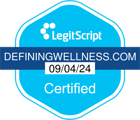Triggers may be situational, emotional, or experiential. However, some commonalities among those with anxiety disorders include family members or friends who have had similar problems.
Unresolved conflict within relationships or work environments, sudden changes in the environment. And social isolation without support structures available when needed most- to name a few specific examples of what may trigger anxieties in people who suffer from them without warning sometimes too.
Identifying any potential triggers if you suffer from acute anxiety is important because knowing what will prompt an episode early on is half the battle, after all.
What Is Anxiety?
Anxiety is a mental disorder characterized by persistent stress, fear, and uneasiness. Anxiety often manifests itself physically as well, chest pains being one symptom. 40 million Americans suffering from this disorder deserve every opportunity to live free from its grip.
Here Are Some Common Anxiety Triggers
Lack of Sleep
Sleep deprivation can worsen anxiety by increasing cortisol levels, the stress hormone. Lack of sleep also affects our ability to concentrate and make decisions, making it harder to handle stressful situations.
If you are having trouble getting enough sleep, finding ways to get better rest is important. Taking breaks during the day, avoiding caffeine in the evening, and creating a nighttime routine can all help improve your sleep quality. Additionally, consider talking to your doctor or therapist about relaxation techniques such as mindfulness or yoga to reduce anxiety levels and help you sleep.
Caffeine
Caffeine acts as a stimulant and releases epinephrine which plays a role in the fight-or-flight response. Drinking excessive amounts of coffee (which contains caffeine) or other caffeinated drinks may make people feel anxious and tense. Drinking less caffeine could help improve feelings of anxiety.
If you find that caffeine is making you anxious, consider reducing your intake. Cut out caffeine after 2 pm to avoid sleep disturbances, reduce your intake of caffeinated beverages, and opt for decaffeinated or herbal teas instead. Some people find that switching to decaf helps to reduce their anxiety symptoms. Additionally, avoid energy drinks, which often contain high levels of caffeine and other additives that can further increase anxiety.
It is important to note that caffeine sensitivity varies from person to person, so it may take some experimentation to determine the right amount for you. If your anxiety persists or worsens despite reducing your caffeine intake, it may be a good idea to talk to a doctor or mental health professional.
Drugs
Drugs can trigger anxiety because they can cause chemical imbalances in the brain that can lead to feelings of fear, panic, and uneasiness. Some drugs may also increase the production of adrenaline, which can heighten your alertness and cause physical symptoms such as increased heart rate and shortness of breath.
Talking to your doctor before taking any medications is important to ensure they are right for you. Your doctor may also be able to provide alternatives if they think the drug could cause anxiety. If you’re already taking a medication triggering anxiety, talk to your doctor about changing the dosage or switching to a different drug.
Stress
Daily, we all experience small frustrations such as traffic jams or missing our trains. Long-term and chronic stresses may lead to long-term anxiety, worsening symptoms, and other health problems. This can then trigger negative behaviors like skipping meals, overindulging in alcohol, or not sleeping enough – which will only worsen the problem, turning it into an overwhelming situation.
Treating and preventing these small day-to-day frustrations often requires learning coping mechanisms easily identified by a therapist or counselor during your sessions.
Symptoms of Anxiety
Anxiety can manifest itself in many ways and has a variety of triggers. Knowing the signs and triggers of anxiety is important to address it as soon as possible. Common anxiety triggers can include stress, fear, overwhelming responsibilities, or environmental changes.
Stress is one of the most common triggers for anxiety. It can come from physical, mental, or emotional pressure that can build up over time. Stressors can range from work deadlines to family problems, and they can cause feelings of fear, panic, and worry.
Fear is another trigger for anxiety. Fear can be a reaction to an unknown situation or event, or a traumatic experience can cause it. This fear can manifest as feelings of dread, terror, or panic.
Overwhelming responsibilities are also known to trigger anxiety. When someone has too many tasks at once, it can feel like there is no way to complete them all. This can lead to feelings of dread, panic, and despair.
Finally, changes in your environment can also trigger anxiety. Moving to a new place, starting a new job, or meeting new people can all create feelings of fear and uncertainty.
By recognizing these common anxiety triggers, you can work towards addressing them as soon as possible and managing your anxiety more effectively. If you think you are experiencing anxiety, talk to a healthcare professional who can provide you with the best treatment.
Seeking Help
Anxiety can be difficult to cope with, and even more difficult to identify the root cause of your anxiety. If you are struggling with anxiety and don’t know where to start, seeking help from a professional such as Defining Wellness Centers can provide the insight and support you need to tackle your anxiety.
At Defining Wellness Centers, our team of experts will work with you to understand the common anxiety triggers and find solutions to manage your symptoms. We will take into consideration your lifestyle, environment, and past experiences to get an understanding of how your anxiety is manifesting. Our team of professionals is committed to providing you with the necessary resources and techniques to help you address your anxiety and build resilience.
We will provide individualized treatment plans tailored to your needs to help you overcome the underlying causes of your anxiety.
If you are ready to take the first steps in tackling your anxiety, contact Defining Wellness Centers today. Our experienced team will work with you every step of the way to ensure you get the support and care you deserve.





















